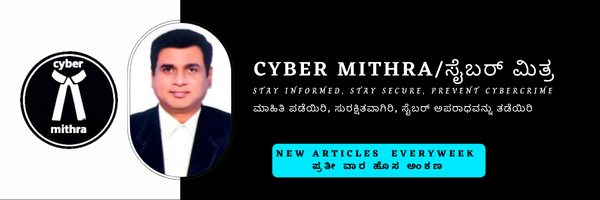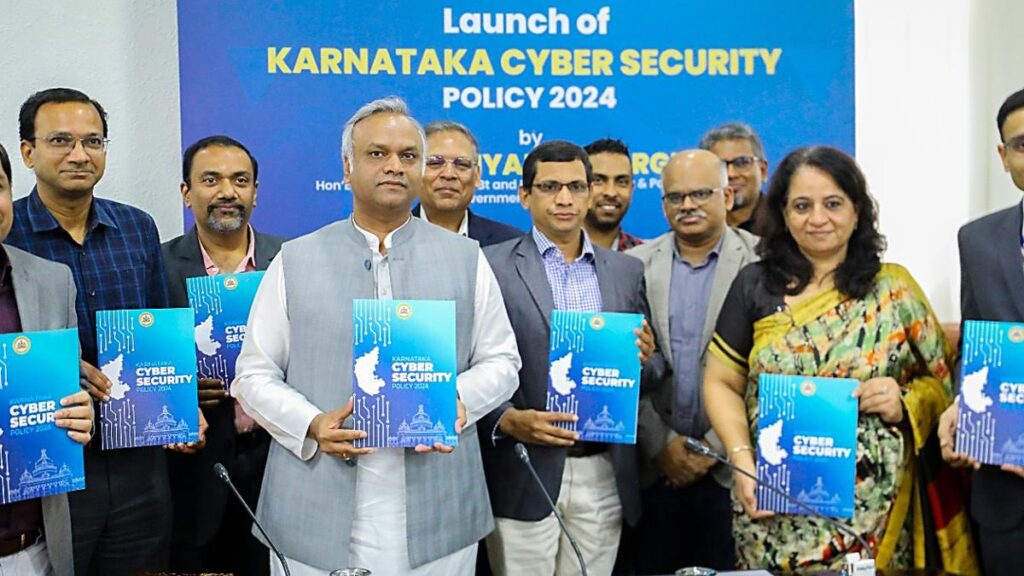Karnataka’s Cyber Security Policy, 2023 Overview
In today’s digital age, cybersecurity has become a critical concern for governments, organizations, and individuals alike. With the increasing reliance on technology and the internet, the risk of cyber threats and attacks has also increased. Computer or cyber security is the protection of computer systems and networks from threats that may result in unauthorized information disclosure, theft of hardware, software, or data, as well as from the disruption or misdirection of the services they provide. Karnataka l has unveiled the Cyber Security Policy, 2024, to combat rising cybercrimes, increase awareness, build skills, boost public-private collaboration and to deploy technologies to protect all digital infrastructure owned by the State and citizens.
Karnataka Cyber Security Policy Features :-
Karnataka Cyber Security Policy has two parts. The first part, which will be in public domain focuses on building a strong cyber security ecosystem across all segments of the society, including public, academia, industry, start-ups and the government. The second part of the policy focuses on strengthening the cyber security posture of the State’s IT assets and it will be internal to the state’s IT teams and departments for their IT implementations.
One of Karnataka Cyber Security Policy stated objectives is “to establish Security Operation Centre (SOC) for all the Government critical IT Infrastructure projects for obtaining strategic information regarding incidents, threats reported as part of the Infrastructure and its system by creating incident response, crisis management through effective, predictive, preventive, protective, response and recovery actions on 24/7 basis”. The policy aims to build a dynamic, secure, and resilient cyberspace for all government-to-government (G2G), government-to-business (G2B), and government-to-customer (G2C) services of the state government. As part of this policy implementation there will also be Fact-Check unit established to detect and prevent misinformation, disinformation, fake news and deepfakes.
The total financial outflow for implementation of the Cyber Security Policy for five years has been estimated at about Rs 103.87 crore, which would be met from the budgetary allocations for the Department of Electronics, Information Technology, Biotechnology and Science & Technology. Of this, Rs 23.74 crore would go towards providing incentives and concessions.
For the students and practitioners in the field of cybersecurity, here is some good news : The Karnataka Cyber Security Policy document proposes internships for students with a target to facilitate 600 undergraduate interns and 120 post graduate interns during the policy period. It offers a stipend of Rs 10,000 to Rs 15,000 per month for a maximum of three months to Karnataka-based undergraduate and postgraduate interns. For research and development (R&D) projects in the cybersecurity domain, driven mainly by Karnataka-based start-ups and in collaboration with Karnataka-based academic institutes, the policy offers grants of up to 50 percent of the project’s total R&D cost, or up to Rs 50 lakh. The policy also includes reimbursements of up to a maximum of Rs 1 lakh towards engagement of Karnataka-based, CERT-In empaneled service providers by start-ups registered with the Karnataka Start-up Cell for cybersecurity audit.
The state government also signed a Memorandum of Understanding (MoU) with the multinational IT firm, Cisco, to train 40,000 people in cyber security skills and awareness. Of them, 50% will be women. This is to diversify the cybersecurity workforce and promote equal opportunities within the tech sector. The Cisco skilling programme will have three parts. CyberOps Associate (CA) for graduates and final year students, providing in-depth knowledge and practical skills to become proficient in cybersecurity operations. Cybersecurity essentials will train in foundational cybersecurity knowledge, and the third Training of Trainers (ToT) that will equip college lecturers with the expertise to train students in advanced cybersecurity concepts.
As part of Implementation of Karnataka Cyber Security Policy, Karnataka Government along with company META, more than one lakh teachers and educating 10 lakh students is being done on online safety. There will be collaboration with social media organizations for safer cyber space.


